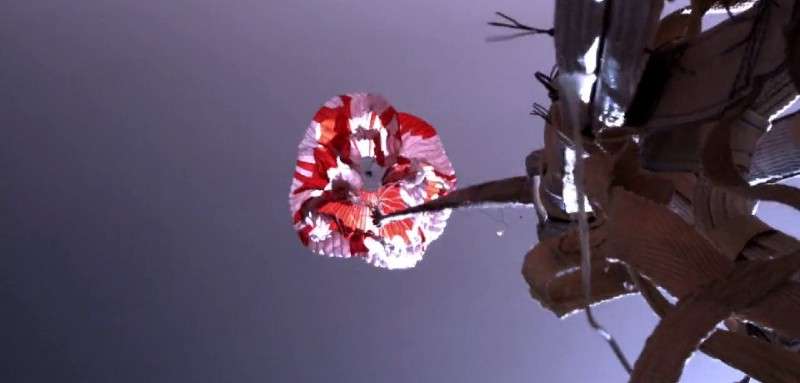Processors in Tech Wearables like Fitbits Could Be Replaced Using Mushroom Mycelium
Processors in tech wearables like heart rate monitors, could be replaced with mycelium which can actually sense electrical signals.

Reprinted with permission from World At Large, a news website of nature, politics, science, health, and travel.
NASA and the world just celebrated the fifth American rover to land on the surface of the Red Planet.
The rover brings with it a host of research equipment meant to examine the planet's surface for signs of ancient microbial life. That data will take a while to put together, but in the meantime-monitoring equipment like microphones and cameras have already sent back some exceptional media tastings of how immersive modern Mars exploration can be.
On Sunday, NASA released the first-ever audio recordings of Mars. You can even here the sounds of the wind blowing on the fourth planet from the sun.
Some days before that, footage of the rover deploying its parachute during its descent came out.

"Now we finally have a front-row view to what we call 'the seven minutes of terror' while landing on Mars," said Michael Watkins, director of the JPL. "From the explosive opening of the parachute to the landing rockets' plume sending dust and debris flying at touchdown, it's absolutely awe-inspiring."
"For those who wonder how you land on Mars-or why it is so difficult-or how cool it would be to do so-you need look no further," said acting NASA Administrator Steve Jurczyk in a NASA statement. "Perseverance is just getting started, and already has provided some of the most iconic visuals in space exploration history. It reinforces the remarkable level of engineering and precision that is required to build and fly a vehicle to the Red Planet."
Perseverance is currently undergoing a long, thorough check and troubleshooting of all its components and systems. Then it will go out in search of points to drill in and around the Jezero crater where it landed.
Meanwhile, it's been taking thousands of photos of its new surroundings. Fortunately they've all been uploaded to the NASA RAW images folder on their website, and include pictures taken during every step of the robot's journey.

As part of its instrument suite, the Ingenuity Mars Helicopter, a simple four kilogram construction of basic materials, will charge up using its solar panel to conduct the first aerial flight on Mars.
The helicopter sent its first status report from its current home attached to the undercarriage of the Perseverance rover-where it will remain for 30 of the 60 total days it will be in operation. All systems are currently working without issue, and it will slowly charge its six lithium-ion batteries for the next phase of the project-periodic bouts of sustained hovering.
If Ingenuity succeeds in taking off and hovering during its first flight, over 90% of the project's goals will have been achieved. If the rotorcraft lands successfully and remains operable, up to four more flights could be attempted, each one building on the success of the last.
NASA and the world just celebrated the fifth American rover to land on the surface of the Red Planet.
The rover brings with it a host of research equipment meant to examine the planet's surface for signs of ancient microbial life. That data will take a while to put together, but in the meantime-monitoring equipment like microphones and cameras have already sent back some exceptional media tastings of how immersive modern Mars exploration can be.
On Sunday, NASA released the first-ever audio recordings of Mars. You can even here the sounds of the wind blowing on the fourth planet from the sun.
Some days before that, footage of the rover deploying its parachute during its descent came out.

"Now we finally have a front-row view to what we call 'the seven minutes of terror' while landing on Mars," said Michael Watkins, director of the JPL. "From the explosive opening of the parachute to the landing rockets' plume sending dust and debris flying at touchdown, it's absolutely awe-inspiring."
"For those who wonder how you land on Mars-or why it is so difficult-or how cool it would be to do so-you need look no further," said acting NASA Administrator Steve Jurczyk in a NASA statement. "Perseverance is just getting started, and already has provided some of the most iconic visuals in space exploration history. It reinforces the remarkable level of engineering and precision that is required to build and fly a vehicle to the Red Planet."
Perseverance is currently undergoing a long, thorough check and troubleshooting of all its components and systems. Then it will go out in search of points to drill in and around the Jezero crater where it landed.
Meanwhile, it's been taking thousands of photos of its new surroundings. Fortunately they've all been uploaded to the NASA RAW images folder on their website, and include pictures taken during every step of the robot's journey.

As part of its instrument suite, the Ingenuity Mars Helicopter, a simple four kilogram construction of basic materials, will charge up using its solar panel to conduct the first aerial flight on Mars.
The helicopter sent its first status report from its current home attached to the undercarriage of the Perseverance rover-where it will remain for 30 of the 60 total days it will be in operation. All systems are currently working without issue, and it will slowly charge its six lithium-ion batteries for the next phase of the project-periodic bouts of sustained hovering.
If Ingenuity succeeds in taking off and hovering during its first flight, over 90% of the project's goals will have been achieved. If the rotorcraft lands successfully and remains operable, up to four more flights could be attempted, each one building on the success of the last.
Ingenuity will have to survive the freezing Martian nights, where temperatures dip as low as -130 degrees Fahrenheit (-90 degrees Celsius), in order to carry out each of these next four flights. The longer it can remain operable, the more information the scientists managing the rotorcraft can learn about how to build better ones in the future.
CHECK OUT: World's First All-Civilian Mission to Space Will Usher in New Era While Raising Money for St. Jude's
"We are in uncharted territory, but this team is used to that," said MiMi Aung, project manager for the Ingenuity Mars Helicopter at JPL. "Just about every milestone from here through the end of our flight demonstration program will be a first, and each has to succeed for us to go on to the next. We'll enjoy this good news for the moment, but then we have to get back to work."
(WATCH the video of Perseverance's touchdown on Mars below.)
SHARE The Far-Out Updates With Friends on Social Media…
Be the first to comment